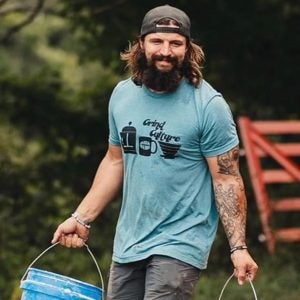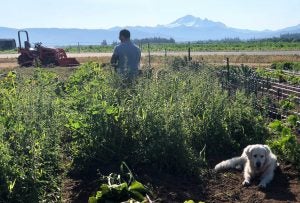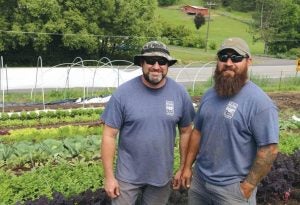I spent six years in the U.S. Air Force as an aircraft maintainer. I worked on a flight line in rain, shine, wind, and really, really hot weather. The military gives opportunities to work with many different people from many different places. There are opportunities to travel and get an education. Relationships with fellow servicemembers can be insulated, depending on where you’re stationed, so the people you meet and the job you do become an integral part of who you are. When you separate from the military, it’s sort of like being shoved out of a nest. It’s a bit of a freefall and you just hope your wings will work.
When I began this piece about veterans and agriculture, I texted Grant Weber, the farm manager at Vets on the Farm in Washington state, to tell him. His immediate response to my news was, “Mission driven, cradle to grave mentality, sacrificing for other people.” In a nutshell, that’s an accurate description of what makes veterans uniquely positioned to be successful in farming.

Matt Schaar from E.D.S. Ranch in Gnadenhutten, Ohio, was an Airborne Infantryman in the Army, then a Green Beret. He says, “During my time in the military, mission was always first, and we trained to never accept defeat. When faced with adversity on the farm, the mission-first mentality helps me accomplish challenging and difficult tasks that are vital to a prosperous farm. In the military, I constantly faced new obstacles that required out-of-the-box thinking, and farming has been no different. The mindset ‘adapt and overcome’ has been equally used in farming as it was during combat operations. My military service has positioned me to be a successful farmer. The [camaraderie] the military provides lives on through the veteran farmer community.”
Related reading: Veterans are a picture of pride for rural America
American service members are inoculated with a sense of integrity, commitment, community, and courage from the moment we step off the bus at basic training. Discipline and adaptability are drilled into us through our entire military career. We are thorough and learn to persevere. By the time we leave the military we have these characteristics ingrained in us. We learn this from the beginning, even through the small tasks, like our dress and appearance, how our beds are made, and how our wall lockers are set up. I remember being asked by a military training instructor, “If we can’t depend on you to get the small things right, how can the Air Force depend on you to get the bigger, more important, things right?”
Military service comes with an already-established social circle and family. You support each other, you hang out with each other, and you celebrate with each other. When you separate from service, you lose these close relationships. They might not be entirely gone, but they aren’t entirely the same. The feeling of disconnection causes a person to feel lost.

Joel Swenson, owner of Charlie Foxtrot Farm in Pateros, Washington, puts it this way: “Before I started my career path as a farmer, I was pretty lost and really had no purpose after getting out. I missed my brothers and sisters, and I was drinking heavily to cope with what I had just gone through, and I felt like I had no direction. I was on a downward spiral of drinking, DUI, substance abuse, and no sense of higher purpose. I felt like I lost my way and resorted to drinking heavily to cope with the experiences that I had during my service.”
Finding farming helped change that.
“I was still helping to treat my brothers and sisters, but in a different way,” Swenson explains. “I was helping heal the invisible wounds caused by war and service to our country through ‘Dirt Therapy’.”
Swenson is right … hands in the soil and nurturing a living thing can be very therapeutic. There’s even developing research suggesting that a soil-borne bacterium, Mycobacterium vaccae, could be the reason why gardening and farming can improve mental health. And the sense of purpose, responsibility, and connection that farming gives veterans who find themselves in this headspace is irreplaceable.
Anne and Tim Devin from Chase Stream Farm in Monroe, Maine, are both Marine Corps veterans. Their farm has a mission of assisting veterans with their goal of being successful in agriculture. In the military, everything is mission motivated. Everything has structure and a reason. When servicemembers separate they lose the mission, structure and purpose and, without a clear path, many find themselves floundering.
Farming has “given us a purpose — and I think that’s one thing veterans miss when they leave the military,” said Anne Devin.

Being in the military makes you acquire characteristics like adaptability and flexibility. As farmers, these are also important skills. As one would imagine, not every growing season goes according to plan. Sometimes there’s a drought. Sometimes there’s an animal attack. Sometimes some disease takes over a crop, and there’s not a single thing the farmer can do about it. There’s no one who can adjust to the chaos better than the Airman, Marine, Sailor, Soldier, or Coast Guardsman who has had to adapt to Uncle Sam with a spectacular military bearing and little-to-no emotions … at least not on their face.
There’s a need for new farmers in America. People willing to do the hard work, the dirty jobs. People who are disciplined, creative, adaptable, community-minded and mission driven. People who require the best of themselves and the best of others. Who are committed to excellence, full of integrity, and have the courage and drive to get results. Those people are veterans. Agriculture needs veterans as much as veterans need agriculture. No one gets the job done quite the way that veterans do, with a smile, creative profanity and a lot of grit.
Farm on.
Check out the farms featured in this article
Charlie Foxtrot Farm in Pateros, Washington
Our mission is to “re-connect veterans to nature through sustainable agriculture and outdoor recreation”. We are part of Tatley Outpost in Pateros, WA, which includes another veteran owned and operated farm, 13 Fox Farm ran by Tim Andrews. We grow hops for beer, medicinal mushrooms, hemp, mixed vegetables and keep bees for honey and wax products. 2021 has a great lineup of interactive workshops to include backyard hop growing, beekeeping and home vegetable gardening. We strive to bring the community together to help veterans become immersed back into the community. We are funded by the VA Farms Grant which helps us put on workshops and create a network of peer support for veterans across the nation.
Please visit www.charliefoxtrotfarm.org and follow them on Facebook and Instagram. Also check out Growing Veterans at www.growingveterans.org, and on Facebook and Instagram.
Chase Stream Farm in Monroe, Maine
Our Mission: Provide high quality organic produce, livestock and food products to target markets throughout midcoast Maine; and provide aspiring military veteran farmers the education and training they need in order to manage or successfully launch their own sustainable farming enterprise.
Please visit www.chasestreamfarm.com and follow on Facebook and Instagram.
Vets on the Farm in Spokane, Washington
Vets on the Farm is designed for Veterans seeking a new mission and a way to transition back into civilian life through careers in agriculture, farming, ranching or other conservation based industries. Our mission is to provide resources and opportunities for education, partnership, and employment to help reach that goal. Vets on the Farm facilitate several ways for Veterans to connect with people in the industry, fellow Veterans, and financial and technical resources to explore. We believe networking is the “weaving of the fabric” of which creates a stronger bond and connection. Vets on the Farm encourages exploration of agricultural and conservation based education by offering programs and curriculum in partnership with WSU Extension and Spokane Community Colleges. Levels of completion will be available and include course certification up to an Associate’s degree.
Check out Vets on the Farm at www.vetsonthefarm.com and on Facebook and Instagram.
E.D.S. Ranch in Gnadenhutten, Ohio
E.D.S. Ranch, LLC sells pasture-raised chicken, turkey, eggs, and pork. They raise cattle, keep bees for honey, grow succulents and a market garden.
Check them out at www.edsranchllc.com and on Facebook and Instagram.
Brianna Scott is a veteran farmer who lives in Eastern Washington while earning her Master’s of Science in Agriculture from Washington State University. She is active in the veteran ag community and raises poultry and livestock while growing a large market garden.



